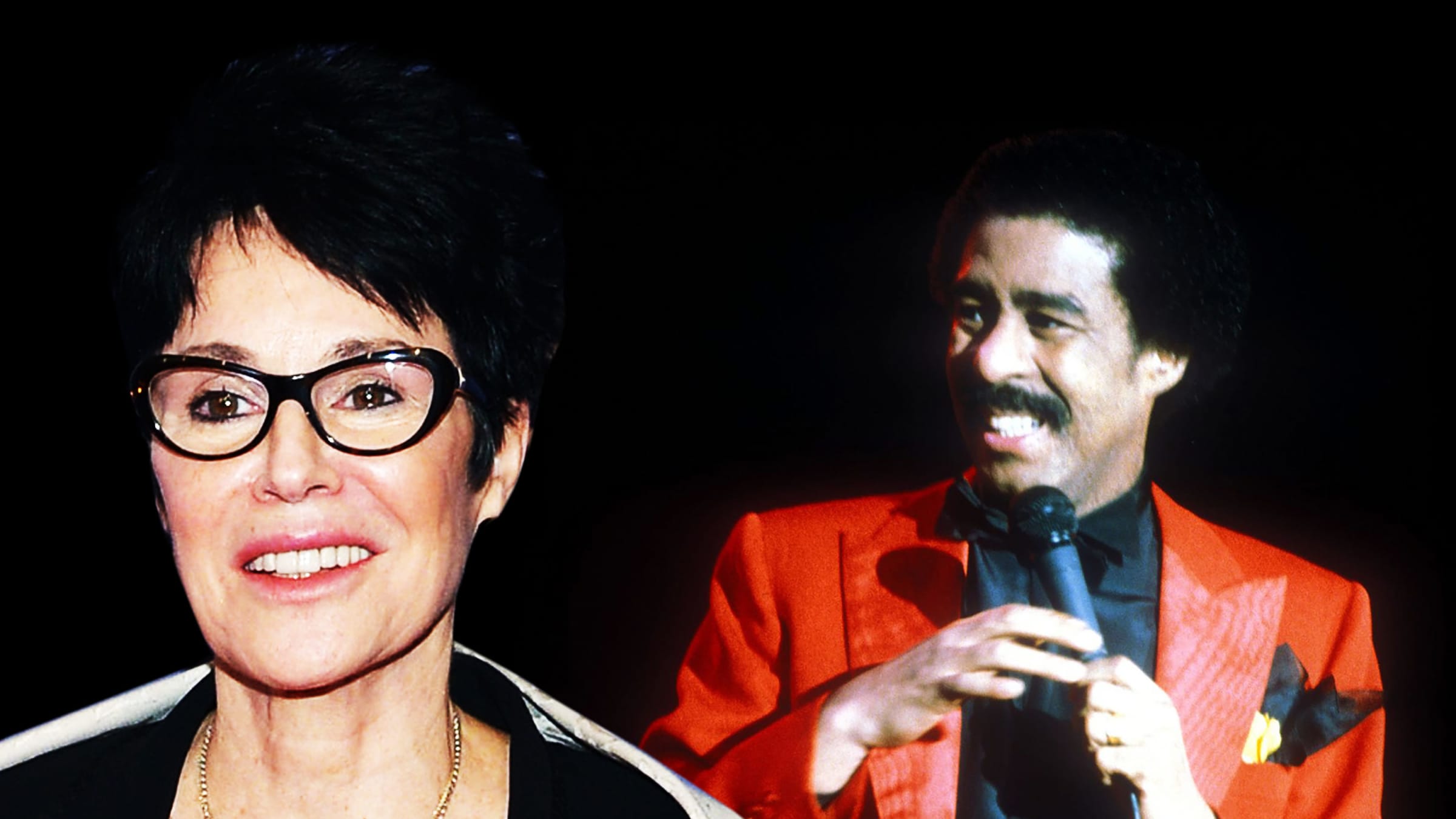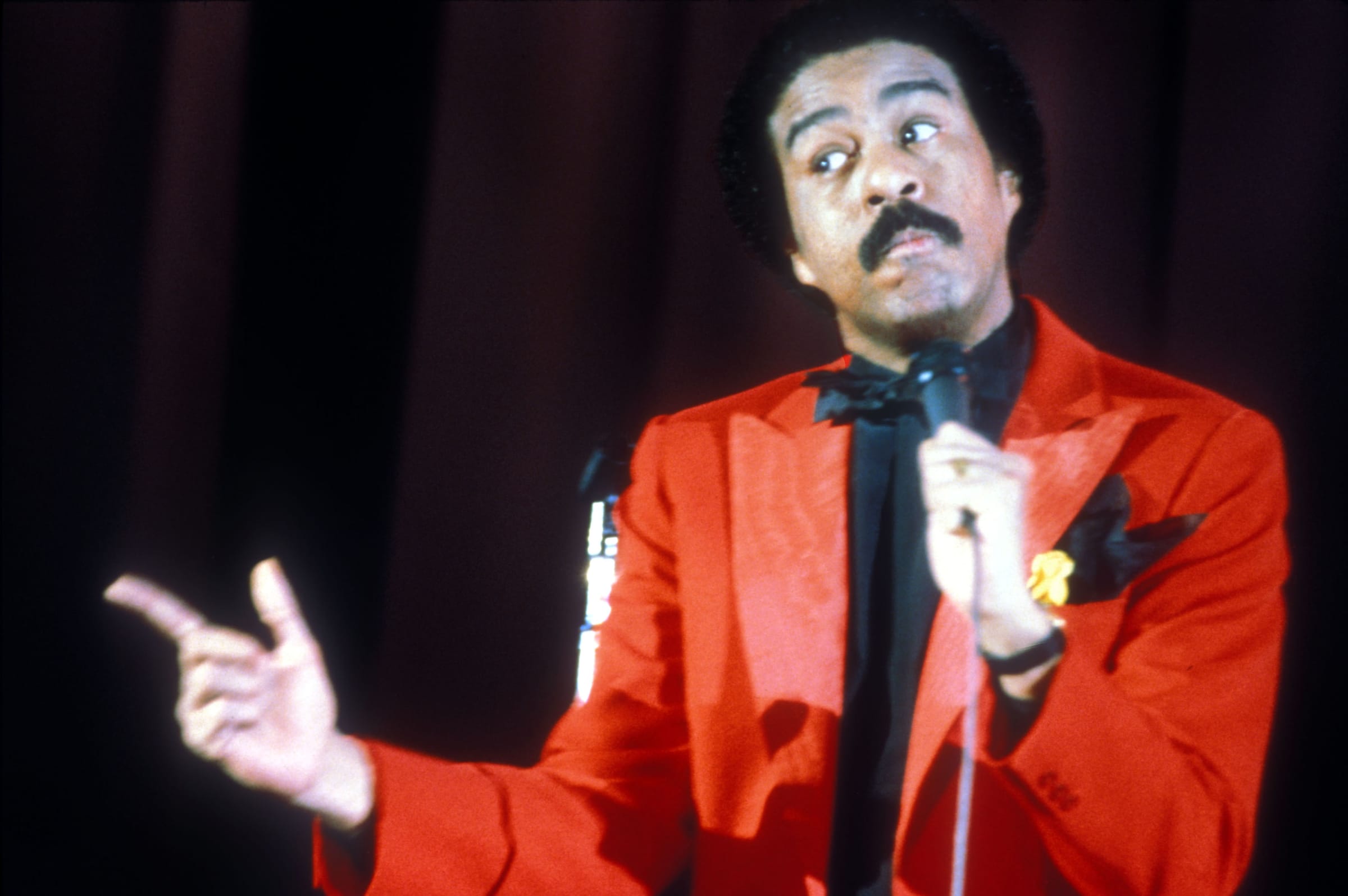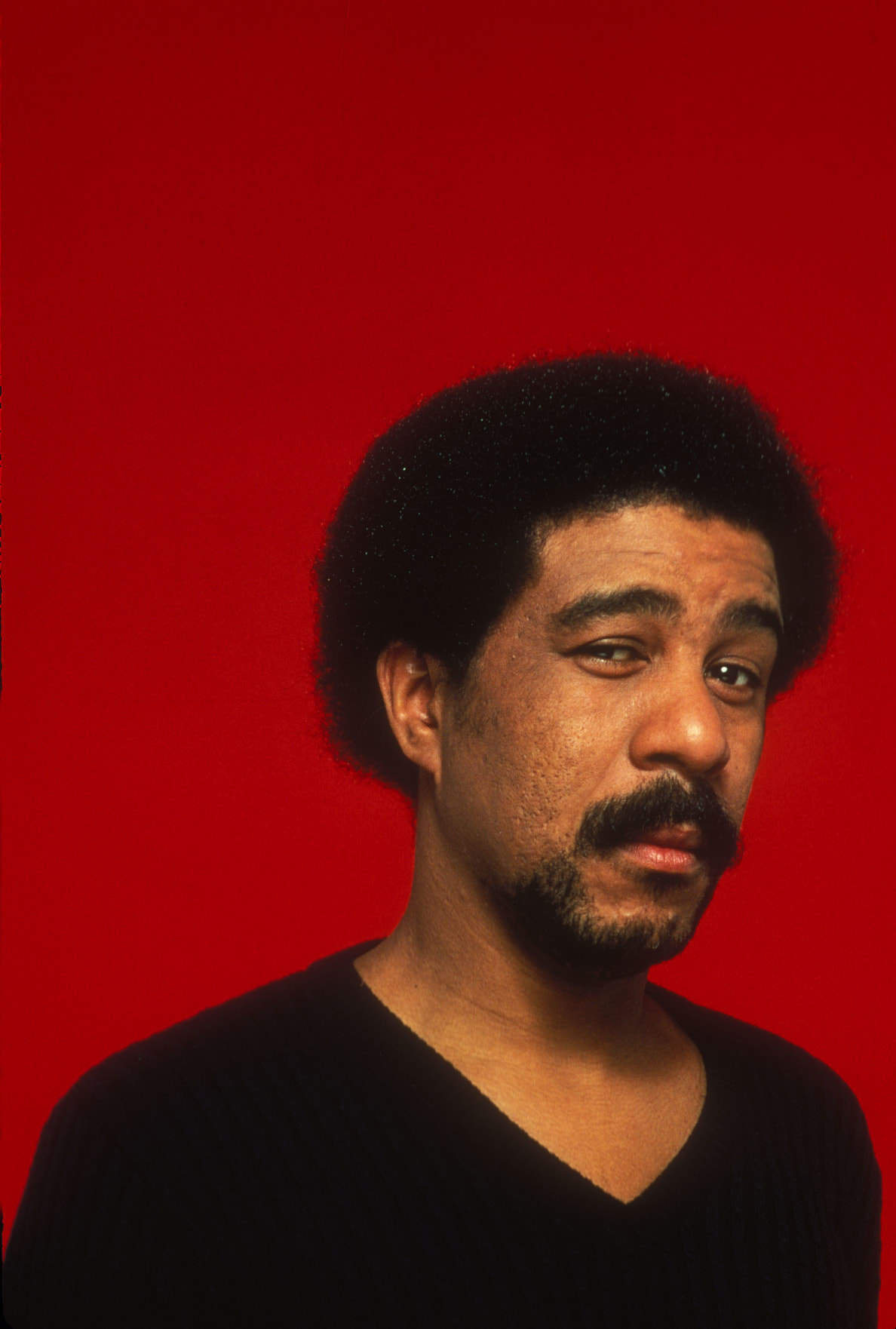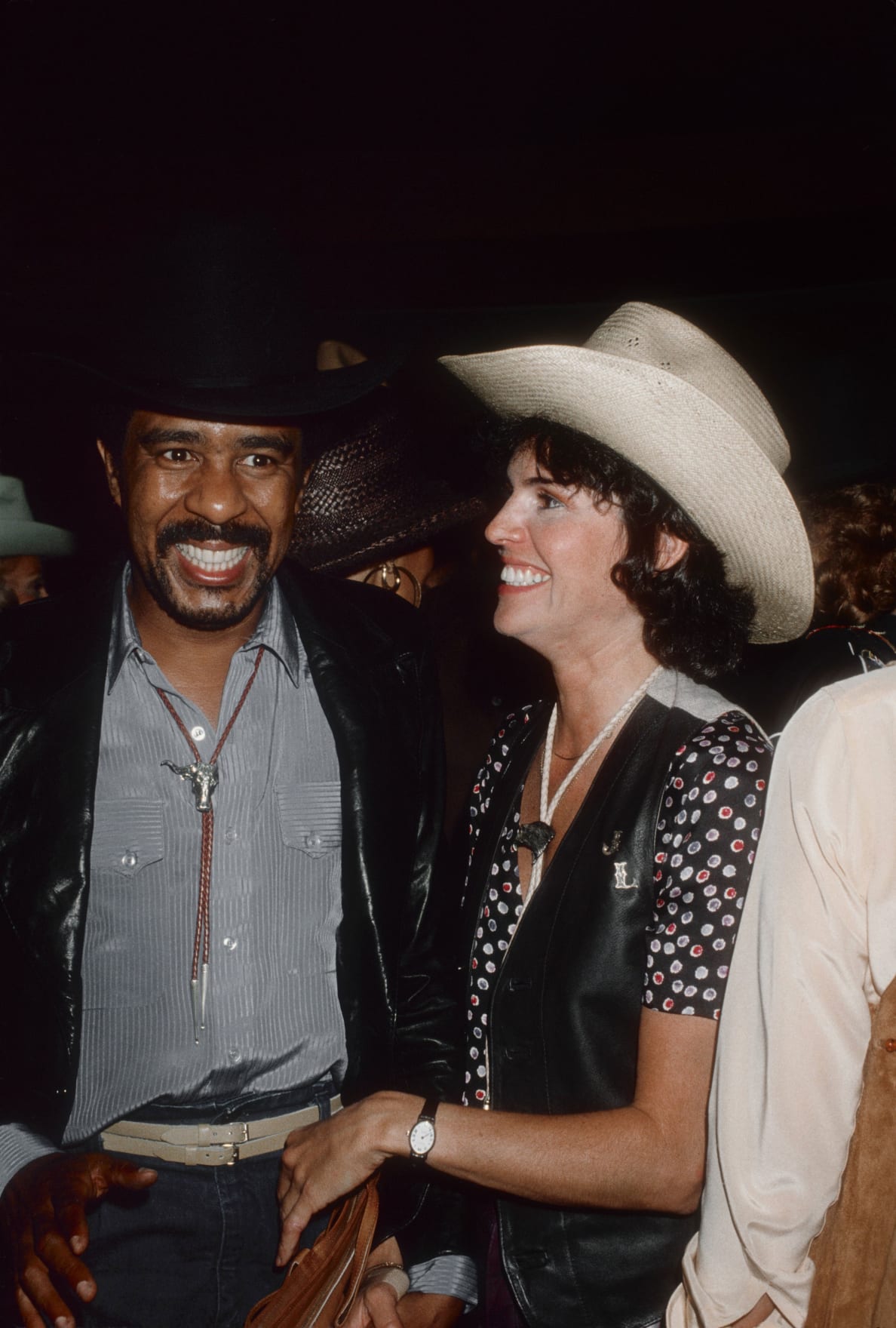Richard Pryor’s Widow on Marlon Brando Affair: ‘He Wasn’t Ashamed!’

Photo Illustration by The Daily Beast/Getty/Paramount Network
Jennifer Lee Pryor opens up about living with Richard, the Marlon Brando affair controversy, working with Harvey Weinstein on the biopic, and a lot more.
Richard Pryor was married seven times to five different women and when people ask Jennifer Lee Pryor “which wife” she is, she always replies, “The best one.” And like the man she married twice, three decades apart, she is not afraid to speak her mind.
On Tuesday, the new documentary I Am Richard Pryor had its world premiere at the South by Southwest festival before it airs on Paramount Network this Friday night at 10 p.m. The film, directed by Jesse James Miller, chronicles the life and career of Richard Pryor, the man widely considered the greatest stand-up comedian of all time.
But it’s hard to watch it without wondering if his massive success came despite his constant efforts at self-sabotage with drugs, abuse and controversy.
Jennifer Lee doesn’t quite see it that way.
“I sometimes think that Richard created chaos for comedy,” she tells me, seated in her hotel suite in Austin, Texas, a few hours before the film’s premiere. “It was fodder, grist for the mill as they say.” She used to ask him, “Richard, is this a real fight you’re trying to start or are we looking for material here?”
Jennifer Lee met Richard when he was looking for someone to help decorate his new San Fernando Valley home in the late 1970s. She was a struggling actress at that point and needed a job so when the opportunity arose, she jumped at it. “I fell in love with him the first day I met him, August 22nd, 1977,” she says. “I was aware of him, but I was not a fan, which was great because I saw the person.”

Courtesy Paramount
What struck her most was Richard’s “complete and total vulnerability,” qualities not always associated with the combative comedian. When she first started working in his house, she says he would “trot out a different woman” every morning. He actually married another woman—actress Deborah McGuire—shortly after Jennifer Lee arrived on the scene, but they divorced the following year after he was charged with assault with a deadly weapon for shooting at his own car that she was using to try to leave him.
That sure seems like “self-sabotage,” but again, Jennifer Lee points out that it ended up in his act. In fact, it became an extended riff in his iconic 1979 special Live in Concert. “Then the police came and I went in the house,” he says on stage. “Because they got Magnums too. And they don’t kill cars. They kill nig-gars.”
“It was great material!” she exclaims. “So, yeah, he had his moments where he would go, ‘Yeah, I fucked up again,’ but the lemonade side of that was, look at how he would turn that into art?” Of course, it wasn’t always fun for her to bare the brunt of those fuck-ups.
“Oh yeah,” she says, “that wasn’t easy.”
Jennifer Lee says “everyone asks” how she could start dating him after what he did to his previous wife—“What was the problem, did you need more information?”—but she “just adored him.” In the film, she adds, “Richard didn’t want a nurse. He wanted a ride-or-die bitch. He wanted somebody who could hang. I could hang.”
“Everything else were just obstacles to be batted away,” she tells me. “I just stood very calm and did my work and stood in the background and got to know him and we had these long talks and I fell in love with him.”
It was during this time that Richard started freebasing cocaine. He would refer to the pipe he used as “the devil’s glass dick.” His addiction caused a rift in their relationship. “I moved out because the drug had moved in,” Jennifer Lee says on screen, a sentiment she repeats in our conversation.
She had left him by the time he infamously set himself on fire while freebasing and drinking rum in June of 1980. He ran down the street in flames before police helped put out the fire and got him to the hospital, where doctors gave him just a one-in-three chance of survival.
Several different voices in the film express the feeling that Richard was never the same after that, but Jennifer Lee found herself returning to his side. They were married (for the first time) in Maui the following year.
She finds it “unfortunate” that the fire incident might be the first thing some people think of when they hear the name Richard Pryor. “It kind of eclipses a lot of his work,” she says. “And when people only want to talk about that, I’m not happy.”
For her, the documentary does a great job of demonstrating how Pryor “changed creative culture” and “not just comedy” by bringing the ideas he learned from hanging out with the Black Panthers in Berkeley into his stand-up. It shows the evolution of his comedy from more tame in his early years to more provocative at his height and even a bit of a retreat in his later years, especially when it comes to the “n-word.”
In 1975, during the first season of Saturday Night Live, Pryor hosted and performed an iconic word association sketch with Chevy Chase that ends with Chase essentially calling him a “nigger” and Pryor firing back “dead honky.” The film also shows him using the word uncensored during a morning television interview, something that would be practically unheard of today.
As much as the audience loved it at the time, it feels like the type of interaction that may have made him uneasy in his later years. Jennifer Lee says that a turning point came during their trip to Kenya in 1979. At one point, he looked around the hotel they were staying at and said, “Jenny, there are no [N-words] here.” Because everyone was black. When they returned, he let everyone know he wouldn’t be using that word anymore.
At the time, she says a lot of people in the black community “didn’t appreciate that,” but now the word is “absolutely taboo, as it should be.”
When I ask why they ended up getting divorced just one year after they were married, Jennifer Lee lets out a heavy sigh. “Oy,” she says. “It went south,” not wanting to elaborate too much beyond that. They parted ways but “never stopped loving each other.”
“Richard always recycled women anyway,” Jennifer Lee says. They “kept seeing each other on and off,” and after he was diagnosed with multiple sclerosis, she says he asked her to come back. “And thank God I did,” she says. “I came back to a mess. People were selling what wasn’t nailed down, and I mean the children, the ex-wives, the girlfriends, business managers, lawyers. And I said there’s a new sheriff in town, close the bank of Pryor.”
They ultimately got married for the second time in 2001, when Richard was confined to a wheelchair due to his disease and just four years before he died of a heart attack at 65. “He had been asking me, and I said, ‘No, you had your chance, you blew it, you screwed up,’” she says. But then it occurred to her that “this is what real love is.”
“It’s not just about the party and the fun and when everything’s going well,” she says. “It’s about the rough stuff. And here, you didn’t get any rougher. I had to deal with so many fires to put out—no pun intended.”
In the years since Richard passed, Jennifer Lee has mostly faded from public view, but she had her own unexpected TMZ moment after Quincy Jones revealed a previously unknown story about the comic in his much talked-about interview with then-Vulture writer David Marchese.
“[Marlon] Brando used to go cha-cha dancing with us. He could dance his ass off,” Jones told Marchese. “He was the most charming motherfucker you ever met. He’d fuck anything. Anything! He’d fuck a mailbox. James Baldwin. Richard Pryor. Marvin Gaye.”
After those comments went viral, TMZ tracked down Jennifer Lee, who confirmed the story, saying, “It was the ’70s! Drugs were still good, especially Quaaludes. If you did enough cocaine, you’d fuck a radiator and send it flowers in the morning.”
Laughing, she says of Jones, “He started pouring the tea and I sort of took the teapot away from him, didn’t I?”

Courtesy of Paramount
After the interview, Jennifer Lee phoned “Q,” as she calls him, and asked, “Are you alright? Because I know they’re coming after you too.” She says he told her, “Jennifer, oh my God, they’re killing me!” She urged him to just “keep telling the truth.” She tells me that Richard also had a “dalliance” with a transgender woman but after she had a “sex change” he “didn’t want anything to do with her.” She plans to publish his diaries and journals, which go into more detail in this area.
Rain Pryor, one of Richard’s daughters from another marriage, ended up posting about the claims on Facebook, denying that her father had sex with Brando and calling Jennifer Lee “my dad’s so called widow” who “needs to keep legitimizing herself and tarnish our dad even after he’s dead.”
“Darling, you weren’t even a twinkle in the eye yet,” Jennifer Lee shoots back. She says she doesn’t give Rain’s comments a lot of “credence” because “having Richard Pryor as a father wasn’t easy.”
“He wasn’t ashamed of it!” she adds. “And when people say, ‘Well let him rest in peace, Jennifer, what are you doing?’ then you’re not a fan, because Richard discussed this. He would be talking about it today if he were here. He’d be pissed off that Q was getting a hard time. He’d probably fill you in on the details!”
Speaking of all his children, she adds, “They don’t know their father the way I know him, clearly, and I think she’s off-base. But that’s OK, I wish them well.”
She points out to me that Richard was very open about his “dalliances” with men in his stand-up, including in a controversial performance at a gay rights benefit show at the Hollywood Bowl in 1977, parts of which are shown in the documentary.
Lily Tomlin, who was also on the bill that night, helped get Pryor on the bill but warned the organizers that they might not like what they got. “He just had to shake things up,” she says.
“I have sucked a dick,” Pryor told the crowd. But then things took a turn. “It’s the first time in my life I ever realized that faggots are prejudiced. Because I don’t see no niggers out here!” he said of the audience. “And when the niggers were burning down Watts, you motherfuckers were doing what you wanted to do on Hollywood Boulevard and didn’t give a shit about it,” he continued to boos. He ended with, “And kiss my happy, rich, black ass!”
Even though those words were “delivered in a hostile manner,” Jennifer Lee says she can see where Richard was coming from. “He was admitting that, hey, I’m kind of one of you—not necessarily one of you—but I know the party, I know what happens, I’m down.”

Richard Pryor and Jennifer Lee at the SHARE party at the Hollywood Palladium on May 19, 1979, in Los Angeles, California.
Getty
It is unclear how many of these issues might end up in the long-gestating and much-troubled Richard Pryor biopic that Jennifer Lee has been trying to get off the ground for years as a producer. She had originally set it up with Harvey Weinstein, but took the project back after the revelations about his history of sexual assault.
“We’re doing a complete reset,” she says, explaining that she never transferred the rights to Weinstein’s company—“thank God”—but has now thrown the previous script away and is developing a new version.
The first time Jennifer Lee met with Weinstein, she tells me it was at his infamous Peninsula Hotel suite and he was, in fact, wearing his infamous bathrobe. “Now, I aged out,” she says, confirming that nothing else happened, “but it was still inappropriate. I don’t let my gardener see me in my bathrobe. I mean come on, it’s a business meeting, dude!”
At one point, they were greenlit to move forward with Lee Daniels directing, comedian Mike Epps playing Richard, and names like Eddie Murphy and Oprah Winfrey attached to play his father and grandmother, respectively. But when Daniels had to back out to focus on Empire, it all fell apart.
“You know what was happening?” Jennifer Lee says. “All Harvey was good at was making fucking announcements.” She says she won’t be announcing anything else about the film until it is real. “It was just a lot of bullshit, at the end of the day,” she says. “Harvey was good at that. He was a marketing genius, let’s be honest. But if that’s all you’re doing? And that’s what it felt like to me.”
Right now, she’s thinking that they will try to get an unknown actor to play Richard, but has some thoughts about who could play her. Kate Hudson was in the mix for a bit, but she has even bigger names in mind, including some women who are a bit older than she was when she met Richard in 1977.
“Gosh, you know, Charlize Theron, I love her. Somebody with that kind of edginess, who can take a punch, sorry but literally, yeah,” Jennifer Lee says. “Nicole Kidman. God, she’s so incredible. And she looks amazing. Can you play 28, bitch? Let’s go!”
